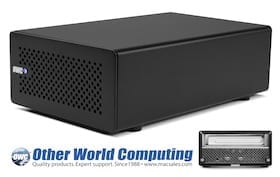 Other World Computing announced today the OWC Mercury Helios PCIe Thunderbolt Expansion Chassis as the solution for using half-length professional-level PCIe 2.0 adapter cards with Mac mini, iMac, MacBook Air, MacBook Pro, and other Thunderbolt-equipped computers that do not have PCIe slots due to size and/or design limitations.
Other World Computing announced today the OWC Mercury Helios PCIe Thunderbolt Expansion Chassis as the solution for using half-length professional-level PCIe 2.0 adapter cards with Mac mini, iMac, MacBook Air, MacBook Pro, and other Thunderbolt-equipped computers that do not have PCIe slots due to size and/or design limitations.
More Users Can Now Tap Into Power of PCIe and Thunderbolt
Desktop workstations used to be the only way computer users could access high-performance PCIe cards made for video capture/editing, media transcoding, audio processing, and data storage. Now, with Mercury Helios, users of portable and all-in-one computers can enjoy the functionality and productivity gains of these PCIe cards wherever their work takes them.
Boosts Workflow Productivity
Mercury Helios is fast and flexible with throughput up to 10Gb/s, and is the perfect solution to massively boost workflow productivity. It’s bootable with AHCI compliant cards and can daisy-chain up to six devices. Types of PCIe cards Helios can use include: Fibre Channel • 10Gb Ethernet • RAID controller • Video capture • Digital audio • Solid State Drive • SAS controllers such as the OWC Jupiter • and FireWire, USB 3.0, eSATA host adapter cards.
Pricing and Availability
The $399.95 MSRP Mercury Helios is now available for order and will begin shipping within 7-10 days directly from OWC and select retailers. Additionally, specially priced Mercury Helios/Mercury Accelsior SSD bundles are available for supercharged data transfer performance up to 620MB/s* and with capacities up to nearly 1.0TB:
- 120GB Mercury Helios PCIe Thunderbolt Expansion Chassis/Mercury Accelsior PCIe SSD – $679.99
- 240GB Mercury Helios PCIe Thunderbolt Expansion Chassis/Mercury Accelsior PCIe SSD – $799.99
- 480GB Mercury Helios PCIe Thunderbolt Expansion Chassis/Mercury Accelsior PCIe SSD – $1079.99
- 960GB Mercury Helios PCIe Thunderbolt Expansion Chassis/Mercury Accelsior PCIe SSD – $1819.99
Features and Specifications
- Use any half-length, single width, full height x1, x4 or x8 Thunderbolt compliant and AHCI compliant PCIe card
- Expansion slots: One PCIe 2.0 x8 (x4 mode)
- Connection interfaces: Two Thunderbolt ports
- Daisy-chain up to six devices
- Bootable with AHCI compliant cards
- External case dimensions: 5.7 in (W) x 8.8 in (D) x 2.9 in (H)
- Weighs 2.4 lbs (without card)
- Ventilated quiet cooling with a variable speed fan
- Automatically powers on/off with computer
- Warranty: 3-year
- Compatible with any computer that can support Thunderbolt technology
“With the advanced processors modern MacBook Airs, MacBook Pros, iMacs, and even the Mac mini offer, these machines are very capable of running advanced applications and processes that rival the Mac Pro,” said Larry O’Connor, Founder and CEO, Other World Computing. “Now with the Mercury Helios, users of these non-PCIe slot equipped machines can tap into the power of PCIe cards and experience capabilities previously unattainable.”
*Editor’s note: release originally listed Helios/ Mercury Accelsior SSD bundle data transfer speed at 820MBs. Accelsior supports data rates up to 820MB/s; when Accelsior is used via Thunderbolt PCIe chassis, performance is up to 620MB/s .





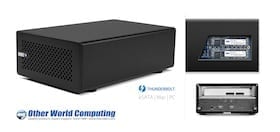
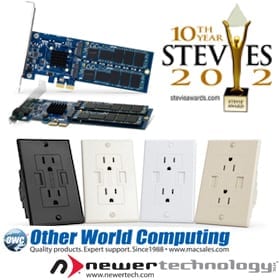
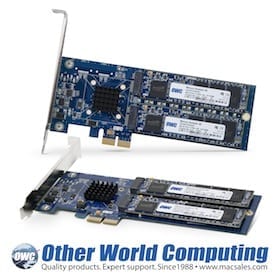



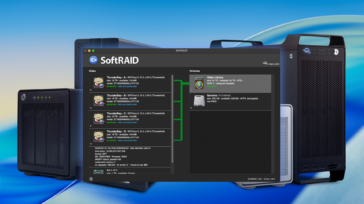


You have a USB 3.0 card on your list. Has this been tested with the 2011 iMacs and does it work at the full USB 3.0 speeds and what is the procedure of installing it and setting up drivers.
Can you recommend an external graphics card that would suit this chassis for driving external monitors, perhaps 3 via DVI??
Im looking at alternatives to the Triplehead2go (Matrox) which properly utilise the power of thunderbolt
Thanks for your help
Regards
Sonny
Currently there are no graphics cards in the compatibility list: http://eshop.macsales.com/tech_center/Thunderbolt/PCIe_Compatibility/
Is there a special reason why the Blackmagic HD Extreme and Studio cards aren’t listed as compatible? Is it because of the HDMI connections on the rear of the card, the wattage, or something else? These cards share the same driver with the other cards that are listed as compatible, so you would thing there wouldn’t be a driver issue.
Also, the Decklink Quad is listed as compatible but appears to be longer than 6.5-inches. Is that information correct?
Many facets play into compatibility with a card’s compatibility with a external Thunderbolt PCIe adapter. It can be as complex as electrical requirements or incompatible drivers or as simple as the fact that the card requires more empty slots than the enclosure itself has available.
For example, many Blackmagic cards have a secondary component that attaches to the inside ports on the card and then mounts in a second PCI slot cover spot. Helios only has one PCIe slot without a second extra slot cover.
We recommend keeping an eye on our compatibility page for any additions/changes as testing continues.
‘PCIe cards need to be compatible with Thunderbolt technology.”
Isn’t this the case only under OSX and not bootcamp?
Unfortunately, we do not support Helios with anything other than OS X at this time. However, it would stand to reason that if it’s hooked up with Thunderbolt, it would need to conform to Thunderbolt standards, regardless of OS.
What about 2.5″ thunderbolt enclosures? Any plans for that?
Unfortunately, we cannot comment on potential future products, but keep an eye out on our blog as once new OWC brand products are available they will be announced here first.
Great, now move all the external drives to dual Thunderbolt plus USB3 as Apple has done with all new Macs!
Couple questions about Blackmagic cards.
Will the Decklink Quad really fit in this enclosure? it looks longer than 6.5 inches.
Why are the Decklink HD Extreme and Studio listed as not compatible? Is it because of the HDMI connections at the rear of the cards? The drivers should be Thunderbolt aware.
will this allow me to use a pci express mid to high end graphics card to play games on a mac mini? because that is what i am waiting for. because i read that windows users can use the thunderbolt pci express chassis to add and use graphics cards for games and i hope us mac users will get the option too because it would be a waste to throw away a mac because of the gpu limitation and this would extent the life of any thunderbolt equipped mac because we can upgrade our gpu via thunderbolt pci express chassis.
PCIe cards need to be compatible with Thunderbolt technology. For a current listing of compatible cards visit http://eshop.macsales.com/tech_center/Thunderbolt/PCIe_Compatibility/
Have you guys tried any USB 3.0 cards that have not worked via the enclosure?
Compatibility requires the installation of Thunderbolt technology-aware drivers – that support is not yet available on any USB 3.0 cards.
Great news and congratulations, guys. I have about 10 of your MiniStack V2, V2.5 and V3 drives sitting around the home office ranging from 250 GB to 2 TB and a couple Voyager Q’s with 3 TB drives in them. I will be migrating to something like this as my requirements shift from high capacity to high performance.
July 26, 2012…. Wow, finally. I think I’ve been clamoring for over a year for this. I was starting to think OWC was just going to skip TB. Personally, I’d like to see a full length card x 16 and maybe space for a second card as well. No biggie, I’m sure they are coming.
I am glad to see the design has changed since the last sneak peak!
Also, did you just undercut Sonnet by $200? Is their shell, really $599? Thats nuts. Not that $399 is cheap for a box that doesn’t do anything until you add to it, but thanks for not saying, “Well the competition is selling it for $599, lets sell it for $595.”
LOL Does it come with a TB cable?
No, the Thunderbolt cable is sold separately – but we do have a special running to get $5 off of an Apple or Kanex Thunderbolt cable when purchased with any qualifying Thunderbolt product (and this product certainly qualifies).
Congratulation for your first and highly anticipated Thunderbolt product !
But first, which PCIe cards (that OWC make/sells) is it compatible with ? Can you make a list ?
Looking at your competitor Sonnet Echo Express Thunderbolt Expansion Chassis for PCIe Cards and their slim compatibility list, Sonnet’s chassis are almost unusable or do not make sense.
What I am particularly looking for your OWC Mercury Helios Chassis are cards that allow connection to multiple-drive non-RAID storage enclosures: eSATA with port multipliers, USB3, etc. – to be used with home Mac Mini Server. It has to be practical, functional and reasonably prized. Thanks
The list is available: http://eshop.macsales.com/tech_center/Thunderbolt/PCIe_Compatibility/
Can you test this card to see if it’s compatible?
http://eshop.macsales.com/item/CalDigit/FASTA6GU3/
As of today, that card does not have the required Thunderbolt technology-aware drivers from the manufacturer.
I’m confused. This would be my dream solution if it worked with my Sonnet Tempo E4P card but listed in your compatibility chart is the “Sonnet Tempo SATA 6Gb Pro 4-port”. What is that exactly? I’m not seeing it on Sonnet’s site.
http://eshop.macsales.com/item/Sonnet%20Technologies/TSATA6PROE4/
Oh wow! So, I could finally use multiple enclosures with port multipliers on my MBP? Wow. Awesome.
Congratulations on releasing another great product!
These replies to others have already been very helpful to us here, answering several of our questions,
Fwiw, I also see that neither of the NewerTech MAXPower eSATA 6G PCIe cards are listed as compatible.
Ok, then. Will this — Sonnet Technologies Tempo SATA Pro 6Gb 4 Port 6Gb/s eSATA PCIe Host Adapter —
mentioned above, in your new — OWC Mercury Helios PCIe Thunderbolt Expansion Chassis —
provide the — OWC Mercury Elite Pro mini Combo Interface drive case —
containing an — OWC Mercury Electra, or *Extreme* 6G SSD —
with better, *real world* (eSATA > PCIe > Thunderbolt connection) read/write throughput, than via the USB 3.0 interface on that same external drive enclosure?
While I know eSATA 6G promises better theoretical performance than USB 3.0, and past USB 3.0 implementations have been sadly lagging even eSATA 3Gb performance for some years; I also know that not all eSATA implementations deliver the performance one would expect, and that USB 3.0 implementations have been improving.
This prospective solution would be for our use with 2011 and 2012 MacBook Pros, and also possibly 2011 and later MacBook Airs.
In particular, we’re seeking a solution to maximize performance while using multiple, external single-drive enclosures connected to each 2011 MacBook Pro, with an enclosure model that itself *at least* supports USB 3.0, in addition to any other interface(s). (To be clear, we are NOT interested in any peripheral devices that offer only one single Thunderbolt port, requiring that they placed at the end of the Thunderbolt chain.)
If the OWC Mercury Elite Pro mini Quad Interface Case supported USB 3.0 and eSATA 6G in addition to FireWire 800, things might be a little simpler for us. (I am also aware of the NewerTech miniStack and Voyager Q models with USB 3.0 and FW800, but which only support eSATA 3Gb and not eSATA 6G.)
I believe that the OWC Mercury Elite Pro mini Combo is the only external enclosure you currently offer with eSATA 6G and USB 3.0; and also that there are currently no USB 3.0 connectivity solutions for the 2011 MacBook Pros (except of course via ExpressCard/34 in only the 17″ models). I’m also aware that Belkin has announced their Thunderbolt Express Dock with USB 3.0, due out this September, which might help our situation.
Any information and guidance you can offer will be most welcome!
Thanks for the great comment/post and will try to answer/address all noted sequentially.
The MaxPower 2 Port standard card is compatible. It’s not as high performance as other options, but perfect for eSATA external hard drive and hard drive arrays. We have next generation cards coming in the future that will be more suitable for getting the most from 6Gb/s SSD externals. The Sonnet 4 port 6Gb/s is currently, in our opinion, likely best suited for the higher performing 6G SSDs.
The Elite mini USB 3.0/eSATA 6Gb/s combo enclosure does provide substantially higher performance via the 6Gb/s eSATA to the Sonnet card vs. connecting via USB3. It’s among the very fastest USB 3.0 equipped solutions – but it is one of the only eSATA 6Gb/s external multi-interface solutions at at the top of game there with nearly the same performance via it’s eSATA port as you see with the drive direct on the SATA 3.0 6Gb/s bus. Now – most of the heavy lifting is done at speeds within the realm of USB 3.0, but there are certainly benefits for higher overall peak MB/s. Remember too that Thunderbolt is limited currently to 10Gb/s – and realworld works out to 700-900MB/s top top top.
The Quad Elite mini, for power and chipset compatibility reasons, is not likely to go to 6Gb/s eSATA. It was exciting to do it on the USB3/eSATA combo model, but is difficult to do it practically with FireWire in the equation. It is still VERY fast with 3Gb/s eSATA.
The Thunderbolt pipeline is long and deep… a little slower pumping, but the products that will be coming out will continue to make it all that and more.
How much power does the unit supply to the cards?
38W is available, but it will only give enough power as a specific card needs.
Will this work to give laptop users an external graphics card to boost video game performance on low end macbook pro/air?
PCIe cards need to be compatible with Thunderbolt technology. For a current listing of compatible cards visit http://eshop.macsales.com/tech_center/Thunderbolt/PCIe_Compatibility/
Please, please spend some time investigating the possibility of using this for an external GPU.
There is a big community out there (even bigger now that TB made it to PCs) that has been waiting for something like this for a long time!
Nvidia GPUs are said to work very well even via expresscard. With Optimus drivers it’s even possible to accelerate internal display.
Please try to accommodate this use case…
It’s the Thunderbolt compatibility of the cards themselves that limit use, not anything on our end. However, that list should be updated as card makers update their offerings, so keep checking there.
hmm, odd then that MSI have demo’d their GUS II with old radeon cards under windows 7 if they need to be thunderbolt aware, I suppose it doesn’t matter – we still need full length and at least 150W – just so tired of waiting, bought the 2011 mac mini server specifically with external graphics in mind.
Yeah, the power seems to be the biggest issue. From what I’ve read so far it seems that getting external GPUs working on Windows is not a big problem while getting them to work on Mac OS is rather hard.
But with 38W of power, using this box won’t fly.
I’d love to get Mac Mini Server hooked up to external GPU. That’d be really really sweet.
Great concept. Really surprised that there is only 1 slot offered. Greatly reduces the attractiveness of this box for wider use. High cost of ownership for 1 slot … Would have been a lot more attractive with 2-3 slots even if the costs were a few $100s higher.
This is just the first of several Thunderbolt-equipped products that we will be launching in the upcoming months. For many, a single slot is more than sufficient.
What I will be waiting for is a thunderbolt expansion chassis that will allow me to use a high performance video card with my Macs. Most are full lenght, I believe. I would also prefer space for at least another card, e.g. an audio card.